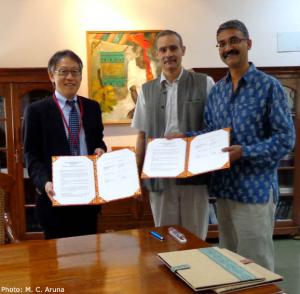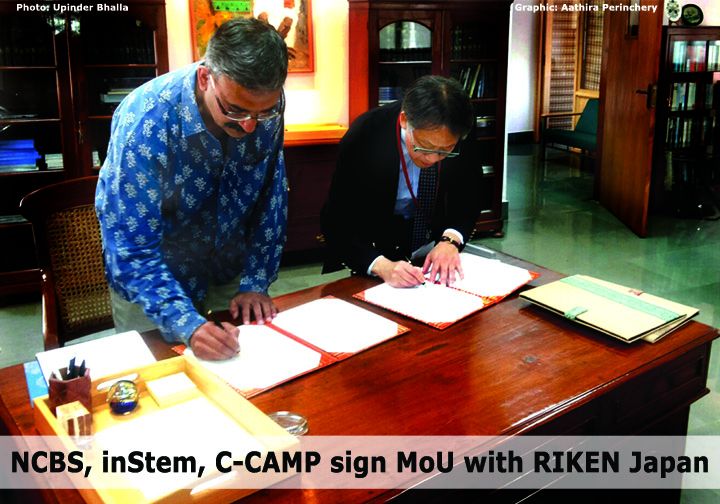The whole is more than the sum of its parts
Aristotle's maxim holds especially true when it comes to scientific research - where the diversity of disciplines adds so much more to forge the gigantic whole. And collaborations are key to the multi-disciplinary approaches that have fostered many contemporary science successes today. Now, after nearly ten years of ongoing collaborations between NCBS and the RIKEN Kobe Institute in Japan, the Bangalore Bio-Cluster comprising NCBS, inStem and C-CAMP has signed a memorandum of understanding (MoU) with RIKEN Japan. The MoU will strengthen ongoing collaborations, now extending to all RIKEN institutes across Japan, promote graduate and post-doctoral exchange programs between the organizations involved and potentially also set up a new research center in the premises of the Bangalore Bio-Cluster.
"I think this is an important engagement which has already been of value to both sides and is poised to grow in new academic and scientific directions," says Upinder Bhalla, Dean of the National Center for Biological Sciences (NCBS). A seven-member group including Bhalla, Satyajit Mayor (the Officiating Director of NCBS), Motohide Yokota (the director of RIKEN's Global Relations Office, GRO) and Moe Abe (member of the GRO), met at the Bangalore Bio-Cluster on 6th February 2013 to sign the MoU with RIKEN. RIKEN conducts extensive research across various multidisciplinary fields of science and technology, from basic research to practical application. Comprising eight centres across Japan, RIKEN was set up in 1917 as a private research foundation, and reorganized in 2003 as an independent administrative institution under Japan's Ministry of Education, Culture, Sports, Science and Technology. With global collaborations, there are now six RIKEN centres outside Japan, the nearest being RIKEN Singapore.
The Bangalore Bio-Cluster will discuss the possibility of hosting one such collaborative centre with RIKEN here as part of the MoU. While the setting up of the RIKEN centre is a long-term vision, there are other activities that the collaboration will promote over the short term. The ongoing collaborations, such as NCBS's mouse facility established in 2004, will continue. "Continuing our very fruitful and long-standing engagement with the RIKEN Centre for Developmental Biology in Kobe and close partnership with Shin Aizawa, the RIKEN-wide MoU opens up huge possibilities for us," says Mayor. The new MoU will make it easier for scientists at the Bangalore Bio-Culster to potentially work with all RIKEN centres across Japan. This includes access to a lot of its resources, something the CEO of C-CAMP (Centre for Cellular and Molecular Platforms) Ramaswamy S., who was also present at the signing of the MoU, is very excited about. "RIKEN has a large synchrotron station called SPring8 and they've built a brand new free-electron laser... I am hoping that with this agreement, we will get much faster access to it. That is one very exciting thing for me personally," he says. Apart from using its cutting- edge technological resources, there is a lot to learn from RIKEN as well. "C-CAMP manages large resources. And RIKEN's biggest strength is managing large resources. We have a lot to learn on how to manage and run facilities from RIKEN," Ramaswamy adds.
Ramaswamy is also faculty and Dean of the Institute for Stem Cell Biology and Regenerative Medicine (inStem), and feels that "this (MoU) should now take us to the next level in engagement". "If you do find something in the laboratory in basic sciences and cell-based therapies, this will give us the ability to try it out quickly on models, which RIKEN know how to do and they're very good at," he says. "They have a lot of expertise in bridging basic biology with engineering, and that I think is something we will benefit substantially from."

From left: Motohide Yokota (Director, Global Relations Office, RIKEN), Upinder Bhalla (Dean, NCBS) and Satyajit Mayor (Officiating Director) with the signed MoU.
Similarly, as a principal investigator whose laboratory at NCBS focuses on systems biology and computational neuroscience, Bhalla is looking forward to the collaboration which throws open all the RIKENs across Japan to the Bangalore Bio-Cluster. "The RIKEN Brain Science Institute is strong in computational neuroscience and memory research, both of which are core research topics for me. So I hope to develop ties with groups working in these areas," he adds.
Apart from forming ties with research groups, the MoU also includes student exchange programs between the Bangalore Bio-Cluster and RIKEN. Graduate students can work at both institutes for a defined period of time. Once the new RIKEN centre is in place at the Bangalore Bio-Cluster, post-doctoral researchers will also be encouraged to take part in exchange programs with RIKEN institutes across Japan. Faculty from both institutes can also deliver lectures or teach entire courses at either Bangalore or Japan.
With all these opportunities that the new MoU will open up, scientists at the Bangalore Bio-Cluster are enthusiastically looking forward to interactions with RIKEN. "The scope and scale of RIKEN is very impressive and multi-disciplinary," says Mayor. "This pan-RIKEN engagement allows researchers from our campus to explore substantive collaborations with excellent scientists ranging from the computational to those exploring the wiring of the brain to physicists who study material properties with cutting-edge tools," he adds. And as Bhalla aptly puts it, "The collaboration, like all such interactions between lively scientific programs, is one which will seed new ideas and extend the capabilities of both sides. Science in general scales as greater than the sum of the parts - I think this will too."

Comments
Post new comment